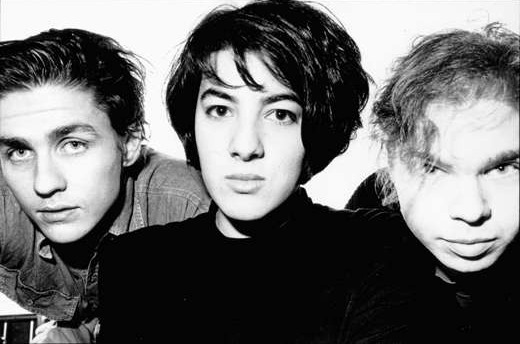- Galaxie 500 broke up after 4 years of making music.
- Richard Linklater's Slacker premiered at Sundance.
"I went alone down to the drugstorePredating Linklater was Dean Wareham (all the way left), and like Linklater he simply did something that you wish you'd thought of first. Play slower, take your time, and pen the poetry happening all around you at any given time. 500 brought a garage band mentality to dream pop. They met at Harvard, were named after a friend's Ford, and borrowed their drumset from Conan O'Brien. In '87, they signed to Shimmy Disc. If you look across their short lived discography, you'll see one defining factor: covers. Galaxie 500 paid homage to their heroes by covering their stuff and branding it with their lackadaisical sound.
I went in back and took a Coke
I stood in line and ate my Twinkies
I stood in line, I had to wait"
-Galaxie 500, Strange
1988's Today contained an immediate influence, Johnathan Richman. Both 500 and The Modern Lovers adhered as proto-punk musicphiles to garage rock rowdiness and mysticism. "Don't Let Our Youth Go To Waste's" first noticeable difference is Wareham's voice, which is more angelic than Richman's. Richman's live Modern Lovers track, which is dominated by his voice, is transformed into a gaze of guitar chunking and ee-and-ahs on the toms and ride.
Today culminates in Tugboat, which is irresistible pop. Swaying into the more-complicated-than-it-seems drum part, this song presents the formula Intro+Lyircs+Solo=G500. After discussing parties, your friends, and the president, Wareham goes metaphorical: "I just wanna be your Tugboat captain," "there's a place i'd like to be..." Repeat. It seems to add layers of thought to the song, which could are multiplied by introspective guitars.
After Today, On Fire from 1989 propelled them to critical greatness. Snowstorm and Blue Thunder further strengthened their regional feel by slow-coring about Route 128 and the weatherman telling all the Cambridge kids about possible school closings. Of course G500 are not the manic MA drivers or snowbound adolescents, but strikingly lethargic non-participants. George Harrison's Isn't a Pity re-charges his 1970s timepiece. It's just as patient, but perhaps a bit happier as Wareham takes it up the scale at the end of the phrase, rather than down.
Joy Divison's Ceremony also goes this route, shoegazed and disillusioned rather than its original epic, forward feel. Standing on the brink of the decade, Strange is an anthem to the fast-moving 90s and seems to foreshadow those who took the back seat. Here We Welcome: internet, video-game popularity, Kevin Smith, and the show about nothing!
On This is Our Music, the group crystallized their sound. Fourth of July is the standard G500 formula: establish a laid back riff, talk quietly, harmonize atmospherically, then shred out a guitar solo to the end. Rim shots and congas are explored on the following track. Spook is an awesome lamenting slow jam. Summertime and Yoko Ono's Listen, The Snow is Falling seem to juxtapose each other, but it sounds as if G500 is the band for all seasons.
Oh yeah, thanks to Domino for re-releasing this stuff.



0 comments:
Post a Comment